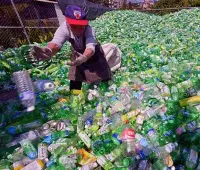East Asia – Taiwan is transforming itself into one of the world’s recycling leaders, according to Chang Tzi-chin, deputy minister at the nation’s Environment Protection Administration (EPA).
 Thanks to Taiwan’s compulsory waste separation by category and pay-as-you-go refuse bags, waste volumes have fallen from a peak of 1.14 kg per person per day in 1998 to 397 grams in 2012. ‘Meanwhile, the recycling rate has risen from 5% to over 54% over the same period,’ Tzi-chin points out.
Thanks to Taiwan’s compulsory waste separation by category and pay-as-you-go refuse bags, waste volumes have fallen from a peak of 1.14 kg per person per day in 1998 to 397 grams in 2012. ‘Meanwhile, the recycling rate has risen from 5% to over 54% over the same period,’ Tzi-chin points out.
In Taiwan, municipal solid waste management policies centre on the extended producer responsibility concept. The country’s ‘signature’ 4-in-1 Recycling Programme spans community residents, recycling industries, local authorities and the so-called Recycling Fund. An estimated 3500 communities and 4000 schools are participating in the programme.
The Recycling Fund is ‘the most important aspect’ of the programme, according to Environmental Protection Administration Taiwan (EPAT), because it currently collects around US$ 23 million per year from manufacturers and importers. The money is used to subsidise private collectors and recycling enterprises that meet stringent EPAT standards.
The fund has ‘greatly advanced’ recycling in Taiwan, the EPA notes. For example, more than 1300 recycling vehicles have been purchased for municipalities since 1998 so that collection of recyclables can be carried out more than twice a week. It has also financed 273 storage facilities for 326 municipal collection squads since 1998.
In a bid for further progress, Taiwan combined its Waste Disposal Act and Resource Recycling Act last summer in a single piece of legislation, the Resource Reuse and Recycling Act. The ‘ultimate goal’ is to make zero waste through total recycling a reality, says the EPA.
For more information, visit: www.epa.gov.tw/en
Don't hesitate to contact us to share your input and ideas. Subscribe to the magazine or (free) newsletter.


